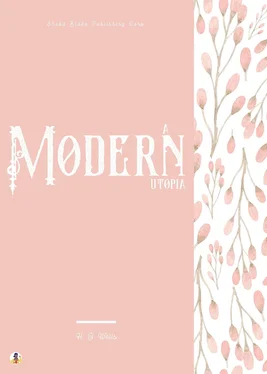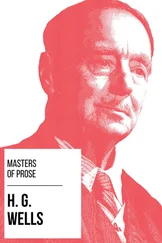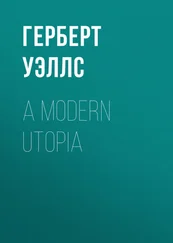Certain liberties, however, following the best Utopian precedents, we may take with existing fact. We assume that the tone of public thought may be entirely different from what it is in the present world. We permit ourselves a free hand with the mental conflict of life, within the possibilities of the human mind as we know it. We permit ourselves also a free hand with all the apparatus of existence that man has, so to speak, made for himself, with houses, roads, clothing, canals, machinery, with laws, boundaries, conventions, and traditions, with schools, with literature and religious organisation, with creeds and customs, with everything, in fact, that it lies within man’s power to alter. That, indeed, is the cardinal assumption of all Utopian speculations old and new; the Republic and Laws of Plato, and More’s Utopia, Howells’ implicit Altruria, and Bellamy’s future Boston, Comte’s great Western Republic, Hertzka’s Freeland, Cabet’s Icaria, and Campanella’s City of the Sun, are built, just as we shall build, upon that, upon the hypothesis of the complete emancipation of a community of men from tradition, from habits, from legal bonds, and that subtler servitude possessions entail. And much of the essential value of all such speculations lies in this assumption of emancipation, lies in that regard towards human freedom, in the undying interest of the human power of self-escape, the power to resist the causation of the past, and to evade, initiate, endeavour, and overcome.
* * *
There are very definite artistic limitations also.
There must always be a certain effect of hardness and thinness about Utopian speculations. Their common fault is to be comprehensively jejune. That which is the blood and warmth and reality of life is largely absent; there are no individualities, but only generalised people. In almost every Utopia—except, perhaps, Morris’s “News from Nowhere”—one sees handsome but characterless buildings, symmetrical and perfect cultivations, and a multitude of people, healthy, happy, beautifully dressed, but without any personal distinction whatever. Too often the prospect resembles the key to one of those large pictures of coronations, royal weddings, parliaments, conferences, and gatherings so popular in Victorian times, in which, instead of a face, each figure bears a neat oval with its index number legibly inscribed. This burthens us with an incurable effect of unreality, and I do not see how it is altogether to be escaped. It is a disadvantage that has to be accepted. Whatever institution has existed or exists, however irrational, however preposterous, has, by virtue of its contact with individualities, an effect of realness and rightness no untried thing may share. It has ripened, it has been christened with blood, it has been stained and mellowed by handling, it has been rounded and dented to the softened contours that we associate with life; it has been salted, maybe, in a brine of tears. But the thing that is merely proposed, the thing that is merely suggested, however rational, however necessary, seems strange and inhuman in its clear, hard, uncompromising lines, its unqualified angles and surfaces.
There is no help for it, there it is! The Master suffers with the last and least of his successors. For all the humanity he wins to, through his dramatic device of dialogue, I doubt if anyone has ever been warmed to desire himself a citizen in the Republic of Plato; I doubt if anyone could stand a month of the relentless publicity of virtue planned by More…. No one wants to live in any community of intercourse really, save for the sake of the individualities he would meet there. The fertilising conflict of individualities is the ultimate meaning of the personal life, and all our Utopias no more than schemes for bettering that interplay. At least, that is how life shapes itself more and more to modern perceptions. Until you bring in individualities, nothing comes into being, and a Universe ceases when you shiver the mirror of the least of individual minds.
* * *
No less than a planet will serve the purpose of a modern Utopia. Time was when a mountain valley or an island seemed to promise sufficient isolation for a polity to maintain itself intact from outward force; the Republic of Plato stood armed ready for defensive war, and the New Atlantis and the Utopia of More in theory, like China and Japan through many centuries of effectual practice, held themselves isolated from intruders. Such late instances as Butler’s satirical “Erewhon,” and Mr. Stead’s queendom of inverted sexual conditions in Central Africa, found the Tibetan method of slaughtering the inquiring visitor a simple, sufficient rule. But the whole trend of modern thought is against the permanence of any such enclosures. We are acutely aware nowadays that, however subtly contrived a State may be, outside your boundary lines the epidemic, the breeding barbarian or the economic power, will gather its strength to overcome you. The swift march of invention is all for the invader. Now, perhaps you might still guard a rocky coast or a narrow pass; but what of that near to-morrow when the flying machine soars overhead, free to descend at this point or that? A state powerful enough to keep isolated under modern conditions would be powerful enough to rule the world, would be, indeed, if not actively ruling, yet passively acquiescent in all other human organisations, and so responsible for them altogether. World-state, therefore, it must be.
That leaves no room for a modern Utopia in Central Africa, or in South America, or round about the pole, those last refuges of ideality. The floating isle of La Cite Morellyste no longer avails. We need a planet. Lord Erskine, the author of a Utopia (“Armata”) that might have been inspired by Mr. Hewins, was the first of all Utopists to perceive this—he joined his twin planets pole to pole by a sort of umbilical cord. But the modern imagination, obsessed by physics, must travel further than that.
Out beyond Sirius, far in the deeps of space, beyond the flight of a cannon-ball flying for a billion years, beyond the range of unaided vision, blazes the star that is our Utopia’s sun. To those who know where to look, with a good opera-glass aiding good eyes, it and three fellows that seem in a cluster with it—though they are incredible billions of miles nearer—make just the faintest speck of light. About it go planets, even as our planets, but weaving a different fate, and in its place among them is Utopia, with its sister mate, the Moon. It is a planet like our planet, the same continents, the same islands, the same oceans and seas, another Fuji-Yama is beautiful there dominating another Yokohama—and another Matterhorn overlooks the icy disorder of another Theodule. It is so like our planet that a terrestrial botanist might find his every species there, even to the meanest pondweed or the remotest Alpine blossom….
Only when he had gathered that last and turned about to find his inn again, perhaps he would not find his inn!
Suppose now that two of us were actually to turn about in just that fashion. Two, I think, for to face a strange planet, even though it be a wholly civilised one, without some other familiar backing, dashes the courage overmuch. Suppose that we were indeed so translated even as we stood. You figure us upon some high pass in the Alps, and though I—being one easily made giddy by stooping—am no botanist myself, if my companion were to have a specimen tin under his arm—so long as it is not painted that abominable popular Swiss apple green—I would make it no occasion for quarrel! We have tramped and botanised and come to a rest, and, sitting among rocks, we have eaten our lunch and finished our bottle of Yvorne, and fallen into a talk of Utopias, and said such things as I have been saying. I could figure it myself upon that little neck of the Lucendro Pass, upon the shoulder of the Piz Lucendro, for there once I lunched and talked very pleasantly, and we are looking down upon the Val Bedretto, and Villa and Fontana and Airolo try to hide from us under the mountain side—three-quarters of a mile they are vertically below. (Lantern.) With that absurd nearness of effect one gets in the Alps, we see the little train a dozen miles away, running down the Biaschina to Italy, and the Lukmanier Pass beyond Piora left of us, and the San Giacomo right, mere footpaths under our feet….
Читать дальше












